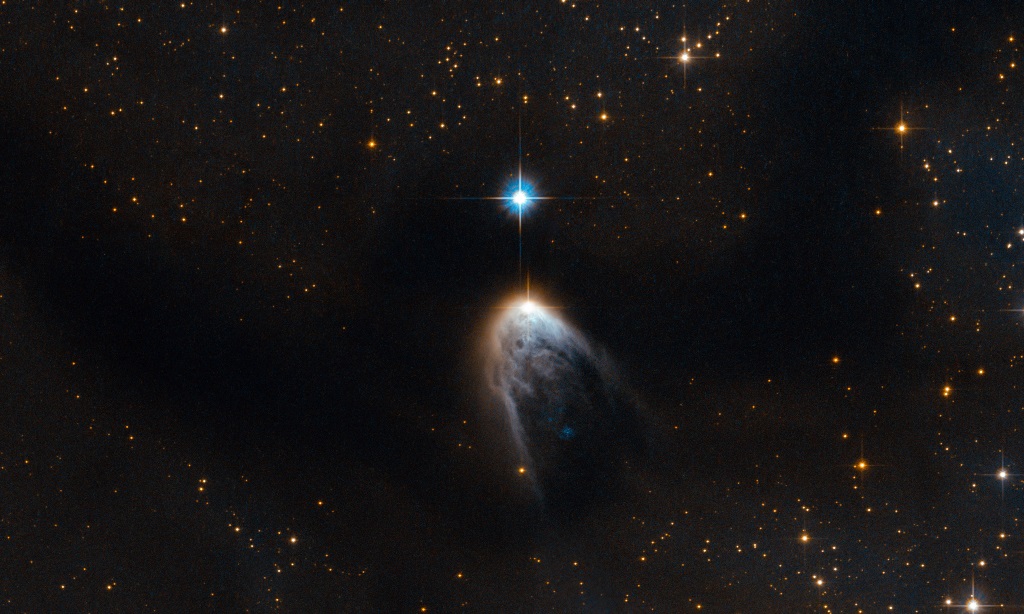
By Alex Phuong
The night sky has served as the inspiration for many poets and writers, from Longfellow’s “The Light of Stars” to “Stars” by Robert Frost, and still does. Profoundly and mysteriously beautiful, Carol Smallwood’s In Hubble’s Shadow is an artistic exploration of mankind’s place in the universe that reminds readers about humility in the face of the finite knowledge of our reality.
In Smallwood’s first section, called “The Universe,” poems explore the nature of time and space. For example, in “A Scattering of Lines,” she explores a universal theme about celestial objects within the universe. Specifically, the last two lines,
Sunlight would reach Earth in a straight line
if it weren’t for the layer of air
reveal the profound design of the universe as well as reality as a whole. Such an idealized depiction of the universe can make readers question the origins of such perfection, and, by extension, the nature of the heavens. Many people continue to speculate where mankind came from, and why everything exists, or whether or not everything is nothing more than a meaningless illusion. Dwelling among such philosophical questions, Smallwood’s poetry is a simple, yet profound, exploration of subjectivity.
The next section, called “The Hearth,” explores the power of home and security. The figurative hearth within these poems asserts that Earth is the only home for mankind, and reminds readers that all people are very minuscule compared to the vastness of the universe. For example, “A Villanelle for Three Dolls,” compares people to insignificant toys in a vast universe. This is the second stanza:
Time and changing circumstances cannot erase
the security of keeping them in full view, a compensation:
three dolls who’ve survived the years are together in one place
The fact that this poem is a villanelle makes the rhyme scheme unique. This stanza is also very symbolic because the dolls represent people, all of whom are creatures by default, and cannot here rival the awe-inspiring nature of the universe. Perhaps all people really are just like dolls because humanity could just be as simple as toys.
The third section of poetry is called “Sea-Change.” Within this section, Smallwood reveals the themes of both constant change and eternal stagnation through her examination of life itself. In, “Live With It,” Smallwood writes:
A few years ago I’d been told to buy a good lutein supply
for macular degeneration due to aging—there’s no going back;
there wasn’t a warning, just jagged lightening in my eye
The overall theme of this poem is coping, as the title suggests. It is appropriately within the section called “Sea-Change” because change is fundamentally the only constant in life. The main figure in this poem has to cope with change and reality, an important skill. Living with any ailment or hardship can be challenging, but overcoming challenges makes people stronger. Perhaps that is why Smallwood included this poetry in a section that relates to the ocean because life itself ebbs and flows like the power of the mighty sea.
Smallwood specializes in pantoums, and published this how-to piece on pantoums. Her command of this Malaysian-derived poetry form is on display in such splendid pieces as “Defining Time.” In the four-stanza poem, I have quoted below the first and last stanzas (of four):
Time’s illusive to understand, define
even with the definitions, planck and light years—
centuries studying, grasping design
a slippery concept to confront human fears.
…
There’s many known poems and quotations,
centuries studying, grasping design
making little sense after all the rotations;
time s illusive to understand, define.
Notice that the first line of the poem becomes the last and the third becomes the third from last. Through the pantoum’s structure, Smallwood has made this poem on time and physics effectively transform into a poem about literature and culture, and subtly drawn parallels between the human experience and the universe.
Smallwood titled the ending of her poetry collection, “Epilogue—Little Is Known.” That powerful title basically sums up all of the themes presented in her book. Some people might be scholars, and others might be intellectually challenged. In spite of the differences that characterize people, the fact is that not much is known about the universe. To this day, abstract questions that befuddled mankind continue to be on the minds of people. The Earth will always metaphorically be “In Hubble’s Shadow” because it is only one small component of the entirely mysterious vastness of the universe.
Carol Smallwood’s over four dozen books include Women on Poetry: Writing, Revising, Publishing and Teaching, on Poets & Writers Magazine list of Best Books for Writers. Water, Earth, Air, Fire, and Picket Fences is a 2014 collection from Lamar University Press; Divining the Prime Meridian, is forthcoming from WordTech Editions. She has appeared in such journals as: Drunken Boat; The Writer’s Chronicle; The Main Street Rag; Jelly Bucket; English Journal. Carol has founded and supports humane societies.
Alex Andy Phuong earned his Bachelor of Arts in English from California State University—Los Angeles in 2015 while also serving as an editor for Statement Magazine.














